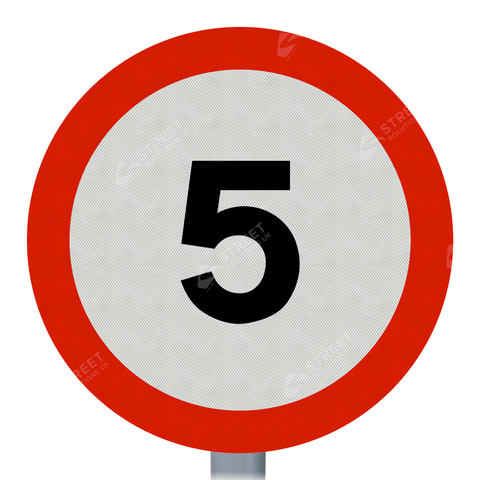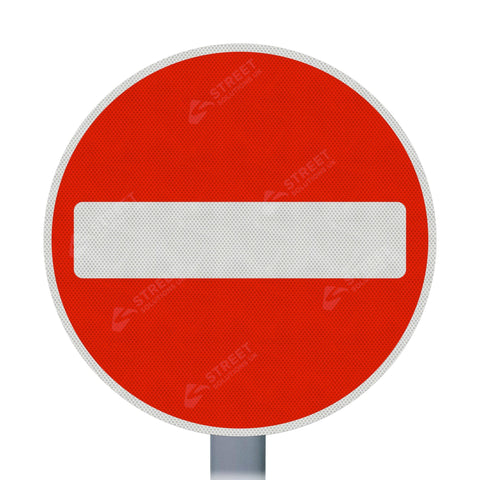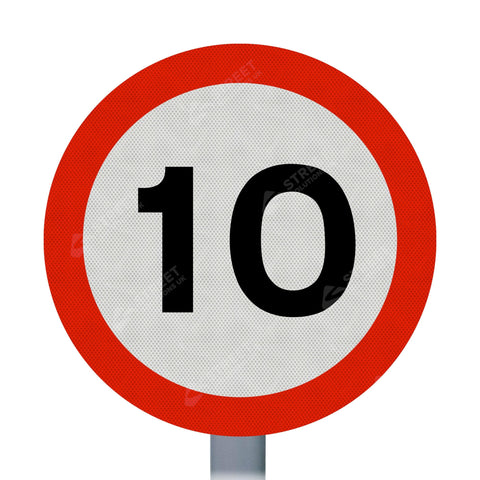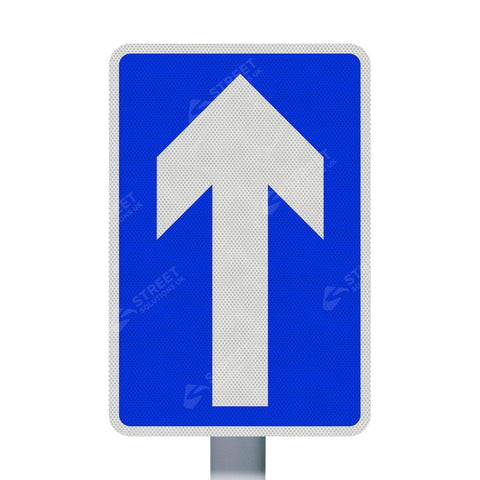Regulatory Signs - Permanent Wall Mounted & Post Mounted
Regulatory signs are crucial elements of traffic management systems that communicate specific rules, regulations, and restrictions to road users. These signs are made of durable materials like aluminium and are either wall-mounted or post-mounted, displaying standardised symbols and text that are easy to understand. They are used to enforce traffic laws and maintain order on the roadways, promoting safety for all road users. Wall-mounted and post-mounted regulatory steel signs can include information about speed limits, parking regulations, weight restrictions, and other rules that drivers and pedestrians must follow. These signs also serve as navigational aids, providing information about directions, distances, and destinations. In short, regulatory signs are vital to ensuring the safe and efficient movement of people and vehicles on the roads.
Regulatory Signs - Permanent Wall Mounted & Post Mounted
We offer a wide range of regulatory signs to help keep drivers, pedestrians, and workers safe on the roads. Our collection includes reflective warning road signs, high-visibility fluorescent customisable regulatory signs, construction site signs, speed limit signs, no parking signs, stop signs, yield signs, school zone signs, railroad crossing signs, and pedestrian signs.
Our customisable road traffic signs are made from durable materials such as aluminium, steel, or plastic and are designed to last for several years, even in harsh outdoor environments. We offer customizable options that allow you to add your own text or images to existing sign templates or create your own custom designs to fit your specific needs.
Whether you're a business owner, contractor, or public agency, we have the regulatory signs you need to keep your community safe. Browse our collection today and find the perfect signs for your needs.
Our page collections include:
- Warning Signs
- Regulatory Signs
- Information Signs
- Supplementary Signs
- Speed Limit Signs
- Posts and Fixings
Express delivery and bulk discounts available to buy. For more information on our products or to get a custom quote on larger orders please get in touch with our sales team on 0161 706 0479 or email us at sales@streetsolutionsuk.com
Frequently Asked Questions
Q: What are regulatory signs?
A: Regulatory signs are signs that communicate specific rules, regulations, and restrictions to road users. They are used to enforce traffic laws, maintain order on the roadways, and promote safety for all road users.
Q: What are permanent wall-mounted regulatory signs?
A: Permanent wall-mounted regulatory signs are made of durable materials like aluminium and are mounted directly onto walls or other permanent structures. They are designed to provide long-lasting, reliable information that can be easily read and understood by drivers and pedestrians alike.
Q: What are post-mounted regulatory signs?
A: Post-mounted regulatory signs are mounted on posts or poles that are installed directly into the ground. They are used in a wide range of settings, including on highways, residential streets, parking lots, and construction sites.
Q: What types of information can be displayed on regulatory signs?
A: Regulatory signs can display a wide range of information, including speed limits, parking regulations, weight restrictions, and other rules that must be followed by drivers and pedestrians.
Q: Why are regulatory signs important?
A: Regulatory signs are important because they help enforce traffic laws, maintain order on the roadways, and promote safety for all road users. They are an essential component of any effective traffic management system.
Q: How can regulatory signs help with navigation?
A: In addition to their regulatory function, regulatory signs can also serve as important navigational aids for road users, providing valuable information about directions, distances, and destinations.
Q: What are the benefits of using permanent wall-mounted and post-mounted regulatory signs?
A: The benefits of using permanent wall-mounted and post-mounted regulatory signs include their durability, reliability, and standardisation. They provide consistent and easy-to-understand information for drivers and pedestrians, helping to ensure the safe and efficient movement of people and vehicles on the roads.
Q: Why are reflective warning signs important for road safety?
A: Reflective warning signs are important for road safety because they are highly visible, especially at night or in low-light conditions. They reflct light from headlights, making them easy to see from a distance. This makes it easier for drivers to anticipate potential hazards and take appropriate action to avoid accidents.
Q: What is the purpose of traffic safety hazard signs?
A: The purpose of traffic safety hazard signs is to warn drivers of potential hazards on the road, such as sharp turns, steep hills, narrow bridges, or other dangerous conditions. These signs are typically yellow or orange in colour and are designed to be highly visible to drivers, giving them time to adjust their driving accordingly.
Q: What makes high-visibility fluorescent custom regulatory signs stand out?
A: High-visibility fluorescent custom regulatory signs stand out because of their bright colours and reflective properties. These signs are designed to be easily seen in all lighting conditions, even from a distance. The fluorescent colours used in these signs are especially effective at catching the eye and getting the attention of drivers and pedestrians.
Q: What are the most common construction site signs?
A: The most common construction site signs include signs that indicate the presence of construction, warn of potential hazards, direct traffic, and provide safety instructions. These signs may include messages such as "Road Works Ahead," "Caution: Heavy Equipment," "Detour," "Slow Down," "Watch for Workers," and "Hard Hats Required."
Q: How do speed limit signs contribute to road safety?
A: Speed limit signs contribute to road safety by providing drivers with clear guidelines for how fast they should be driving in a given area. By following the posted speed limit, drivers can reduce the risk of accidents and increase the overall safety of the road.
Q: What are the consequences of parking in a no parking zone?
A: The consequences of parking in a no parking zone can vary depending on the location and local regulations. In many cases, drivers may receive a parking ticket or be subject to fines. In some cases, their vehicle may be towed or impounded.
Q: What is the meaning of a stop sign and when should you stop?
A: A stop sign means that drivers must come to a complete stop before proceeding. Drivers should stop at the stop line, crosswalk, or before entering the intersection if there is no stop line or crosswalk. Drivers should also yield to other traffic or pedestrians who have the right of way.
Q: When should you yield to other drivers or pedestrians?
A: Drivers should yield to other drivers or pedestrians when they do not have the right of way. This may include situations where there is a yield sign, when entering a roadway from a driveway or side street, or when approaching a pedestrian crossing.
Q: Why are school zone signs important and what do they mean?
A: School zone signs are important because they warn drivers to slow down and be extra cautious when driving near schools or in areas where children are likely to be present. These signs typically indicate reduced speed limits, crosswalks, and other safety features designed to protect children.
Q: What should you do when you approach a railroad crossing sign?
A: When approaching a railroad crossing sign, drivers should slow down, look both ways for approaching trains, and be prepared to stop if necessary. Drivers should also be aware that trains can take longer to stop than cars, so it is important to give them plenty of space.
Q: What are some common pedestrian signs and what do they mean?
A: Common pedestrian signs include crosswalks, pedestrian crossings, and signs indicating where pedestrians should walk or cross. These signs are designed to alert drivers to the presence of pedestrians and help ensure that pedestrians can cross the road safely.
Q: How can safety signs help prevent accidents in the workplace?
A: Safety signs can help prevent accidents in the workplace by warning workers of potential hazards, indicating where safety equipment is located, and providing instructions for safe work practices. By following these signs and taking appropriate safety measures, workers can reduce the risk of accidents and injuries.
Q: What are some important features to consider when choosing warning signs?
A: When choosing warning signs, it is important to consider factors such as size, colour, visibility, and the specific message that the sign conveys. Signs should be large enough to be seen from a distance, and should use colours and symbols that are easy to recognize and understand.
Q: How can directional signs help people navigate complex environments?
A: Directional signs can help people navigate complex environments by providing clear and concise information about where to go and how to get there. By following directional signs, people can save time and avoid confusion when navigating unfamiliar spaces.
Q: Are there any regulations regarding the design and placement of regulatory signs?
A: Yes, there are regulations regarding the design and placement of regulatory signs. These regulations vary by jurisdiction, but typically include requirements for sign size, colour, and location. It is important to follow these regulations to ensure that signs are effective and legally compliant.
Q: How can I customise regulatory signs to fit the specific needs of my business or organisation?
A: You can customise regulatory signs by adding your own text or images to existing sign templates, or by creating your own custom designs. Many sign manufacturers offer online design tools that allow you to customise your signs to fit your specific needs.
Q: What materials are typically used for making regulatory signs?
A: Regulatory signs are typically made from materials such as aluminium, steel, or plastic. These materials are durable, weather-resistant, and can be easily moulded into the required shape and size.
Q: How long do regulatory signs typically last before needing to be replaced?
A: The lifespan of regulatory signs can vary depending on the materials used, the environment they are placed in, and other factors. However, many signs are designed to last for several years, with some lasting up to a decade or more before needing to be replaced.
Q: Are there any discounts or special offers available for bulk orders of regulatory signs?
A: Yes, many sign manufacturers offer discounts or special offers for bulk orders of regulatory signs. It is worth checking with your supplier to see if they offer any discounts or promotions for large orders.





